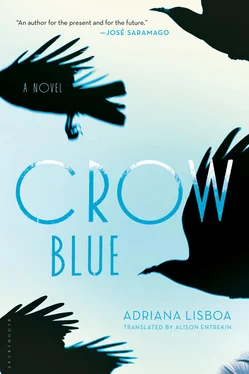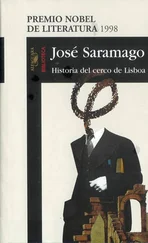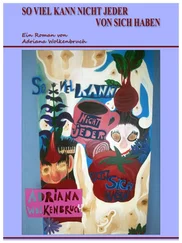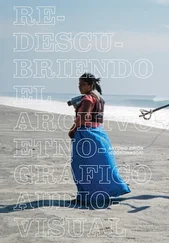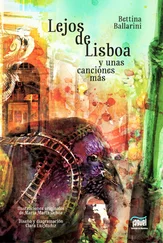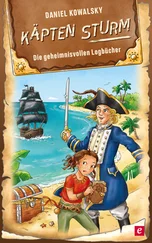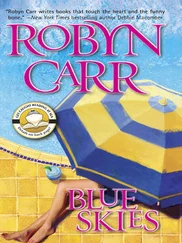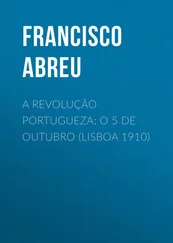I mentioned it to Fernando at lunch, between mouthfuls of the couscous that came in a yellow box and was ready in five minutes. He grumbled something with his mouth full, in English, that I didn’t understand. And said he was going to take me to the corn maze and that it would be much better than what’s-her-name-that’s-right-Aditi-Ramagiri’s damned party.
I wanted to say that it wasn’t Aditi’s fault. I wasn’t mad at her. I wasn’t even mad at Mrs. Ramagiri, customs are customs, rules are rules, each family has its own, and Fernando grumbled something else with his mouth full, in English, that I didn’t understand.
In the back seat, as the husky-voiced woman’s husky piano played between bursts of fundraising, and Fernando drove the red Saab towards the corn maze, Carlos sucked on his juice box a little more and said: More portugués, por favor .
I was the one who got us out of the corn maze. Fernando left it all up to me. Carlos was nervous, with the nervousness of all young children about to see the Big Bad Wolf try to trick Little Red Riding Hood for the billionth time. What big eyes you have, etc. The drama is there even when they know the ending off by heart. And they suffer just the same. And in this manner children test the world, make sure that it really will answer the same question the same way every time. And they conclude that it will. Yet another false campaign promise of the adult world. Yes, Carlos, we are coherent. Grow up and see for yourself.
Carlos walked down the corridors of the maze hewn in the corn field as if he could really get lost there, and for all time. He held my hand. And looked into my eyes from time to time, as if checking to see how reliable I was.
I did what he expected of me: I pretended that the danger was real and on our heels, death waving at us in a corn field in a suburb of Denver sponsored by Starbucks, the First Bank of Colorado and Spicy Pickle. As if we were in a Stephen King novel or a film adaptation of a Stephen King novel.
The afternoon fell and the temperature was dropping and now even Fernando had resorted to a jacket. Carlos’s cheeks were red. So it really was true that climatic revolutions annihilated the broad, horizontal heat of July, of August. It really was true that September came and at the end of that month it was autumn and with autumn things changed interests, like lovers who were already a bit bored of one another.
Fernando was always looking at some place that seemed strange and faraway. Fernando seemed strange and faraway. But that was him in general.
Later, back at home, Fernando spread out a dog-eared map of New Mexico and a dog-eared map of Colorado on the dining table. He joined them at the border. They were so worn that their folds were faded and had already torn in some places. He showed me where Albuquerque was. He explained the distances, traced the highways with his fingers. He talked about the winter I was born. He didn’t like Interstate 25 but it was the quickest route to Albuquerque. The prettiest was the U.S. 285, which left the southwestern tip of Denver’s urban cluster and wound its way into the mountains. I read the names of the cities it passed through. Fairplay, Poncha Springs, Saguache, Monte Vista, Alamosa, Antonito. And in New Mexico, Tres Piedras, Ojo Caliente, and the capital, Santa Fé.
I wasn’t used to maps, but there was something intriguing about them. Sitting there, in Fernando’s living room, at night, a mapable world didn’t seem possible. It was all an abstraction — different highways, borders, states and countries, towns with names like Ojo Caliente or Fairplay. But those abstractions were really there, situated in very specific, localizable places, hence maps, and that was the intriguing part. If I got in a car and followed those tiny yellow veins and continued following the tiny yellow veins portrayed by other maps I would come across different borders, states and countries, towns with names like Fairplay and Ojo Caliente, and Juárez if I continued, and Chihuahua and Zacatecas. And if I carried on, overland, I would pass through Mexico City and Oaxaca, and then there would be Guatemala City and Tegucigalpa, Managua, Alajuela, Panama City, Medellín, Bogotá, and suddenly I would see Amazonian Brazil before me. Continuing, there would be the Araguaia and its memory and its forgetting of a guerrilla army, and from there, crossing another three states, I would arrive once again at Copacabana Beach and its Atlantic mollusks dreaming blue dreams at the bottom of the sea.
In all of these places, all of them, there were many Daniels and many fathers of thirteen-year-old girls. Some had possibly even gone astray.
I’d like to go to New Mexico, I said, without even realizing I’d spoken, which is why I was surprised when Fernando shrugged and said we can go.
Can we visit the house I used to live in? (The house I used to live in: a character in a fairytale. An imaginary being.) Can we visit this June lady?
Why not?
I looked at him and in my throat I asked, without letting my voice out: Why are you doing all this?
Mentally, he answered: Because you asked me to.
Then I looked away. Neither of us was very fond of sentimental words, even sentimental words that weren’t actually spoken, that laid in wait. The mere potential, the simple possibility that something of the sort might exist threatened to make the world mushy and sappy, and in a mushy, sappy world people don’t live, they just slip about and complain.
My father. the idea still sounded almost fanciful. A treasure hunt. A pot of gold at the end of a rainbow. What if I made it to the end of the rainbow and the pot of gold was really filled with second-rate chocolate coins, the sort that taste like wax? What if the rainbow had no end?
Perhaps my father was an optical phenomenon too. Red, orange, yellow, green, blue, indigo, violet. The dispersion of sunlight. The “X” that marked the location of the treasure on the map but which was maybe a silent hole that someone had beat me to. A joke. A hoax.
My father might be: in prison, dead, traveling, exiled, in a hospital or mental institution, living on the streets, on an island in the Caribbean, on a military base in Bulgaria, on a scientific base in Antarctica, in a Buddhist monastery in the Philippines, looking at paintings and smoking a pipe on a bridge in Paris.
My father might be too old, too young, weird, too good-looking, too thin, brilliant, aloof, bald, good-humored, too fat, extroverted, religious, hairy, ugly, very learned, short-sighted, athletic, kind of quarrelsome, bearded, successful, very musically talented. My father might have fathered other daughters and other sons.
I mentally listed off the possibilities as I made coffee, certain that my father would allow himself to be divined in any of them. It made me a little anxious. Anxiety is a hostile feeling that grips your stomach with crooked, cold, possessive fingers.
The coffee, a Brazilian brand bought in the store that sold Brazilian products, dripped into the pot. The toast toasted in the toaster. The house, snuggled up in drawn curtains and closed doors, smelled of coffee and toast.
Fernando was asleep and perhaps my father’s faces, or my mother’s face, were in his dreams. Or the faces of that Amazonian war which, I had yet to find out, he would never forget. He would forget his phone number, his address, his own name, and the sound of his own voice before he would forget that. When the enemy advances, you withdraw, and when you have to withdraw sometimes you stumble.
He was asleep and I was making the coffee that would sit there in the artificial heat of the electric coffee-maker for too long until all of its integrity was suffocated in the taste of burnt straw. I drank the coffee fresh and ate my toast and got my backpack and jacket.
Читать дальше
